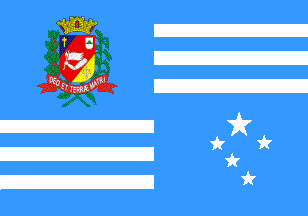 image by Ivan Sache, 30 December 2012
image by Ivan Sache, 30 December 2012
Last modified: 2013-01-01 by ian macdonald
Keywords: sao paulo | brazil | assis | bars: 8 (horizontal) | coat of arms | cross: christ knights | southern cross |
Links: FOTW homepage |
search |
disclaimer and copyright |
write us |
mirrors
 image by Ivan Sache, 30 December 2012
image by Ivan Sache, 30 December 2012
Other sites:
Assis was founded by Francisco de Acis Nogueira and José Machado de
Lima, owners of the Taquaral Estate on the banks of river Pari. On 1
July 1905, Francisco de Acis Nogueira offered a piece of land to
establish a chapel dedicated to the Sacred-Heart of Jesus, St. Francis
of Assisi and St. Anthony. The village that developed near the chapel
belonged to the municipality of Campos Novos do Paranapanema (today,
Campos Novos Paulista). The establishment of a station by the
Sorocabana Railway caused the boom of the village. The district of
Acis was established by State Law No. 1,496 of 30 December 1915.
The municipality of Acis was established by State Law No. 1,581 of 20
December 1917. The inhabitants used to write the name of the place
"Assis" instead of "Acis", which was eventually adopted as the
official name of the municipality.
http://www.camaraassis.sp.gov.br/historia/historia-cidade - Website
of the Municipal Council
The flag of Assis is prescribed by Municipal Law No. 1,238 of 31 March 1968. Designed by José Botelho, the flag was approved by the Commission set up by the Legislature and the Executive, including representatives of teaching, commerce and of the liberal class.
The flag is light blue with the municipal coat of arms in the upper
hoist, three white bars across each of the upper fly and lower fly
quarters, and the constellation of the Southern Cross in the lower
fly. The three white bars represent the legislative, executive and
judicial branches of government.
http://www.super10.com.br/pma/padrao.asp?cod=133 - Municipal website
Photos of the flag:
http://www.flickr.com/photos/dechamps/3423059681
http://www.camaraassis.sp.gov.br/galeria-de-imagens/2012/junho/18-06-2012-21a-sessao-ordinaria/DSC_0016.JPG/view
A copy of the flag used indoors has narrower white stripes:
http://www.camaraassis.sp.gov.br/galeria-de-imagens/2012/marco/delegado-luiz-anto-ramon-faz-visita-a-pres-celio-diniz/DSC_0065.JPG/view
http://www.camaraassis.sp.gov.br/galeria-de-imagens/2012/05-maio/11-05-2012-mocao-de-aplauso-ao-dr-antonio-benedito-schiavao/DSC_0015.JPG/view
The coat of arms of Assis is prescribed by Municipal Law no. 294 of 6 August 1954. The coat of arms is tierced per bend sinister, blue with a gold Latin cross, red with the arm and banner from the São Paulo city arms, and gold with a white pair of scales. In sinister chief is an inescutcheon, white with a green triangle. The shield is flanked by coffee and sugar cane and the motto is "DEO ET TERRAE MATRI" (God and Mother Country).
Blue is the color of the sky. The golden cross is a symbol of the
faith of the colonizers of the outback, recalling the first population
nucleus protected by the cross of Christ and placed under the
patronage of St. Francis of Assisi.
Red is the color of triumph in fighting. The armoured arm, in 16th
century style, refers to the time of discovery. It indicates acts of
defense and increase of the municipality. The arm hold a four-pointed
banner, alluding to the pioneers' conquests that enlarged the borders
in the four compass directions. Like the cross of the Portuguese
sailors recall them as discoverers of the world, the banner recalls
the historic pioneers, such as João Amaro, Antônio Raposo, Bartolomeu
Bueno, Domingos Jorge and Fernão Dias, who covered the outback with
their banners. White is a symbol of loyalty, nobleness and glory.
The white inescutcheon with the green triangle recalls the flag of
Minas Gerais, as a tribute to Captain Francisco de Assis Nogueira, who
offered the land to establish the new town subsequently named for him.
The scales are a symbol of law and justice, recalling that Assis was
an outpost for the colonization of the fertile areas located north of
river Paraná.
The four towers of the mural crown are set up symmetrically, to
represent a model town where order, harmony and piece reign.
Coffee and sugarcane are the main sources of income for the
municipality.
http://www.super10.com.br/pma/padrao.asp?cod=133 - Municipal website
Ivan Sache, 30 December 2012